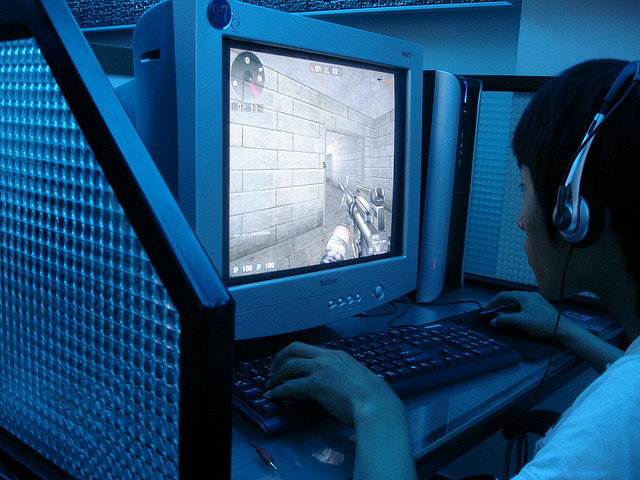
A young kid at Internet cafe PC bang in South Korea. Photo by Flickr user Jens-Olaf Walter (CC BY-NC 2.0)
South Korea's Constitutional Court has ruled in favor of a controversial online gaming regulation, the so-called shutdown bill, that prohibits kids from playing online games at night.
The decision has sparked numerous jokes and mockery online, as well as serious concerns about the ruling's repercussions in the online game industry, students’ rights and net freedom.
The law, which prohibits kids under age 16 playing online games from midnight to 6 a.m., was introduced in 2011, but was met with severe backlash. Online gaming industry and digital content associations filed a lawsuit in the Constitutional Court questioning the bill's legality.
According to local report [ko], judges determined that the bill was constitutional because “considering online gaming's high popularity, addictiveness and [kids’] overindulgence [in it], it is not an overreaction to regulate gaming for kids under age 16.” They specifically singled out online games, adding, “Online games, as they are based on interactivity on the web, are more additive and easily lead kids to game for long hours.”
Bloter.com focused on [ko] the court's definition of kids – “Kids, unlike adults, lack the self-control over how much time is spent gaming” – and wrote that this reflects how society views young people, as merely immature. Other local reports voiced concerns [ko] that this ruling could set a dangerous precedent, tipping the scales in favor for the country's controversial addiction law, which treats online games just like other additive substances and activities such as drugs, alcohol and gambling.
Many Twitter users tweeted that anyone seriously considering children's health would worry more about the country's notorious study craze, which forces kids to attend private tutoring sessions and cram until late at night.
중독성이 강해서 게임 셧다운이 합헌이면, 치킨도 셧다운 대상인가요?
— 유정근(Xeri) (@byxeri) April 29, 2014
If the shutdown law was declared constitutional because of the game's addictiveness, then would chicken qualify for regulation?
수면권 보장을 위해 합헌이 되었다고 하면 밤잠을 설치게하는 드라마/영화/음악 기타 미디어 컨텐츠들도 셧다운 걸어주시죠. 이제 핸드폰에도 셧다운걸겠네
— HL (@namhyelynn) April 24, 2014
They say the law was declared constitutional in order to protect kids’ right to sleep. Then you should have shut down all entertainment including soap operas, movies, music and more, which hinder people's sleep. [If this logic continues] they could even consider shutting down my cellphone.
셧다운이 합헌이란다. 그러면 그 시간에 진행되는 학원교육은 왜 법적 제한을 가하지 않는 것인가 궁금하다. 똑같이 ‘수면권 침해'하는 것 아닌가? 둘 다 학생이 자율적으로 끊을 수 있는 게 아니지 않은가? 왜 다르게 적용하는거지?
— 안태호 (@athmtg1) April 25, 2014
They rule the shutdown law constitutional. Then how come there is no legal restrictions imposed on the Hagwon [after-hours cram schools] which happen within the same time window? They both violate the students’ right to sleep, and both cannot be stopped by students’ will. Why is this being applied differently?
‘게임 셧다운제 합헌’ 판결..법률적 정당성은 확인했지만 과연 실효성이 있을까. 부모 아이디든 뭐든 간에, 할 애들은 다 한다. 애들 위해서라면 학원, 과외, 야자 셧다운부터 해야한다는 주장이 훨씬 더 설득력 있음.
— 유종현 (@consline) April 25, 2014
The game shutdown law was ruled constitutional. Although they came up with a legal justification for this decision, I still doubt its effectiveness. Kids who really want to play games will find ways to do so, including using their parents IDs. Funny enough, some people's claim that they should first shut down the Hagwon, private tutoring and late-night classes, for kids sounds more persuasive.
셧다운제도 합헌 “헌재 재판관 7대 2 결정” http://t.co/kYCBRwpVtn + 이로서 16세 미만 청소년들은 자유의지가 없는 인간으로 딱 낙인을 받게 되었군요.
— B.C. (@leben98) April 24, 2014
By getting seven out of the nine votes of the constitutional judges, the shutdown was declared constitutional. With this decision, kids under age 16 were declared human beings without free will.
내생각에, 게임 셧다운 합헌이라 함은, 결국 인권의 제한을 두는게 아닌가하는 생각이다. 학생들의 자율과 창의를 막음은 물론이고 문화컨텐츠 산업에 장애를 불러내는 의미라본다. 공은 세게 튀기면 더높이 튄다. 사회적 저항을 국가도 예상했어야 한다.
— 이재현(Jason Lee) (@jasonreturns) April 24, 2014
Declaring the game shutdown law constitutional could lead to the restriction of human rights, as it could not only hinder students’ autonomy and creativity, but hobble the cultural content industry. When you throw a ball to the ground, the harder you throw, the higher it bounces back. The authorities should have been aware of the social recoil against this decision.
Blogger Mahler listed [ko] several reasons why the ruling could become a threat to web freedom and online content:
1) 이를 계기로 본인인증이 확대되면 웹상의 자율성을 침해할 수 있는 여지가 많아진다. 예를 들어 인터넷 접속 자체에 본인 인증이 필요하게 되면 상상하기도 무서운 상황이 된다. 2) 중소기업들은 본인인증 및 차단을 위한 조치(기술/장비)를 취하는 것이 엄청난 부담이다. 대기업 vs 중소기업의 문제에 더해 외국기업 vs 국내기업의 문제도 생긴다.[…] 3) 온라인 게임 못지 않게 오프라인 게임도 중독성이 강하다. [….] 나 게임 그렇게 하고도 유급 안 했다.
1) If this regulation is later expanded to a process of identify verification on the web, it is highly likely that such a situation would lead to the violation of web freedom. For example, when this law transforms into bills that force users to verify their identity whenever they login to the Internet, that would be horrendous. 2) For small and mid-size companies, preparing the logistics for the application of this shutdown law is a huge burden since they have to acquire the technology and devices for ID verification and such. Burdens can be felt differently according to the company's size, as well as the company's nationality. […] Lastly, I personally have never failed a class despite all the gaming I did.







3 comments